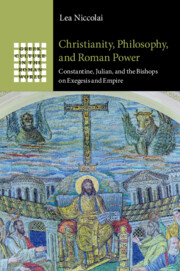 Christianity, Philosophy, and Roman Power
Christianity, Philosophy, and Roman Power Book contents
- Christianity, Philosophy, and Roman Power
- Greek Culture in the Roman World
- Christianity, Philosophy, and Roman Power
- Copyright page
- Dedication
- Epigraph
- Contents
- Figures
- Preface
- Acknowledgements
- Abbreviations, Editions, and Translations
- Introduction
- Part I At Constantius’ Court: Julian Caesar
- Part II Making and Breaking Constantine: Julian Augustus
- Chapter 3 Holy Hermeneutics
- Chapter 4 A Life for a Life
- Part III After Julian: Philosophy in the World
- Conclusions
- Bibliography
- Subject index
- Index Locorum
Chapter 4 - A Life for a Life
from Part II - Making and Breaking Constantine: Julian Augustus
Published online by Cambridge University Press: 07 July 2023
- Christianity, Philosophy, and Roman Power
- Greek Culture in the Roman World
- Christianity, Philosophy, and Roman Power
- Copyright page
- Dedication
- Epigraph
- Contents
- Figures
- Preface
- Acknowledgements
- Abbreviations, Editions, and Translations
- Introduction
- Part I At Constantius’ Court: Julian Caesar
- Part II Making and Breaking Constantine: Julian Augustus
- Chapter 3 Holy Hermeneutics
- Chapter 4 A Life for a Life
- Part III After Julian: Philosophy in the World
- Conclusions
- Bibliography
- Subject index
- Index Locorum
Summary
Chapter 4 concludes the analysis of Julian’s reckoning with Constantine’s propaganda. It focuses on Julian’s strategy to disavow the public persona of the first emperor who had promoted the association between Christian sovereignty and ideals of philosophical leadership. The first section considers the efforts of Constantine’s propaganda to use the events of his (Constantine’s) life to prove that Roman history was guided by Christian providence. The engagement with autobiography in Julian’s final writings appears in this light as the culmination of his response to Christianity’s claims of intellectual dominance over Greco-Roman culture. The second section reconstructs Julian’s joint attempts to project his life as the token of his superior understanding of providential history (Against Heraclius) and to mobilise past Roman history as a source of counter-exempla disproving Constantine’s claims (The Caesars). In the process, Julian repurposed a fundamental element of Constantine’s propaganda – imperial iconography – to his advantage (Caesars; Misopogon).
Keywords
- Type
- Chapter
- Information
- Christianity, Philosophy, and Roman PowerConstantine, Julian, and the Bishops on Exegesis and Empire, pp. 166 - 206Publisher: Cambridge University PressPrint publication year: 2023
